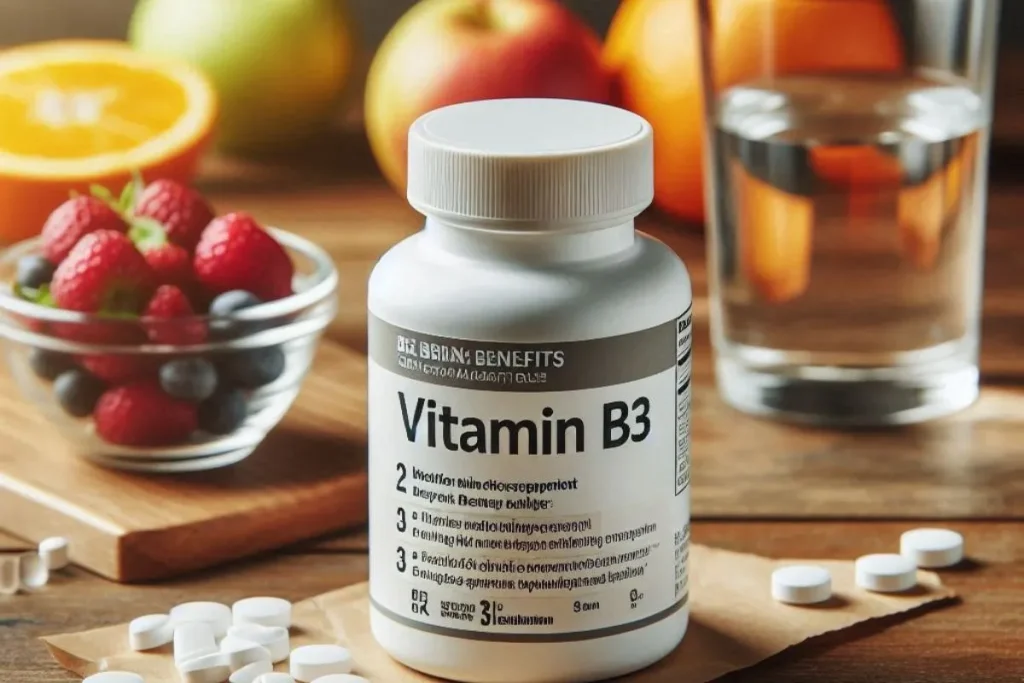Vitamin B3, also known as Niacin, is a crucial nutrient that plays a vital role in maintaining overall health and wellness. Understanding the benefits of Vitamin B3 can help you appreciate its importance in your diet and lifestyle. This article delves into the various advantages of Vitamin B3 and how it contributes to your well-being.
What is Vitamin B3 (Niacin)?
Vitamin B3, or Niacin, is one of the eight essential B vitamins. It is a water-soluble vitamin, meaning it dissolves in water and is not stored in the body. This makes it important to consume adequate amounts of Niacin daily through diet or supplements. Vitamin B3 exists in two main forms: nicotinic acid and niacinamide, both of which are found in various foods and supplements.
Health Benefits of Vitamin B3 (Niacin)

1. Boosts Metabolism and Energy Production
One of the primary functions of Vitamin B3 is its role in converting food into energy. Niacin is a key component of coenzymes NAD and NADP, which are involved in cellular metabolism. These coenzymes help break down carbohydrates, fats, and proteins, providing the energy needed for various bodily functions.
2. Supports Cardiovascular Health
Vitamin B3 is known for its positive effects on cardiovascular health. It helps reduce levels of bad LDL cholesterol and triglycerides while increasing good HDL cholesterol. This balancing act helps lower the risk of heart disease and supports overall cardiovascular function.
3. Improves Skin Health
Niacinamide, a form of Vitamin B3, is widely recognized for its benefits to skin health. It helps reduce inflammation, improve the skin barrier, and enhance moisture retention. Niacinamide is also effective in treating acne, reducing redness, and minimizing the appearance of fine lines and wrinkles.
4. Enhances Brain Function
Vitamin B3 plays a critical role in maintaining brain health. It supports cognitive function by promoting healthy nerve function and protecting brain cells from damage. Adequate Niacin levels have been linked to a reduced risk of age-related cognitive decline and neurodegenerative diseases like Alzheimer’s.
5. Aids in Digestion
Niacin is essential for proper digestion. It helps produce stomach acid, which is necessary for breaking down food and absorbing nutrients. A deficiency in Vitamin B3 can lead to digestive issues, including indigestion and poor nutrient absorption.
Sources of Vitamin B3 (Niacin)
Ensuring you get enough Vitamin B3 is crucial for reaping its health benefits. Here are some excellent dietary sources of Niacin:
- Meat and Fish: Chicken, turkey, beef, and fish like salmon and tuna are rich sources of Niacin.
- Whole Grains: Brown rice, barley, and whole wheat products contain significant amounts of Vitamin B3.
- Legumes: Beans, lentils, and peanuts are excellent plant-based sources of Niacin.
- Nuts and Seeds: Sunflower seeds, almonds, and peanuts are also good sources of Vitamin B3.
- Vegetables: Green peas, potatoes, and mushrooms provide additional Niacin to your diet.
Recommended Daily Intake of Vitamin B3
The recommended daily intake of Vitamin B3 varies depending on age, sex, and life stage. For adults, the recommended dietary allowance (RDA) is approximately 14-16 mg per day. Pregnant and breastfeeding women may require slightly higher amounts. It’s important to consult with a healthcare provider to determine the appropriate Niacin intake for your individual needs.
Potential Side Effects and Precautions
While Vitamin B3 is generally safe when consumed within recommended amounts, excessive intake can lead to side effects such as:
- Flushing: High doses of nicotinic acid can cause flushing, a temporary reddening of the skin.
- Gastrointestinal Issues: Overconsumption of Niacin can lead to nausea, vomiting, and stomach discomfort.
- Liver Damage: Prolonged high doses of Vitamin B3 can potentially cause liver damage.
It’s crucial to use Niacin supplements under the guidance of a healthcare professional to avoid adverse effects.
Conclusion
Vitamin B3 (Niacin) is an essential nutrient that offers a multitude of health benefits, from boosting metabolism and supporting cardiovascular health to enhancing skin and brain function. By incorporating Niacin-rich foods into your diet and following recommended intake guidelines, you can unlock the full potential of this vital nutrient for your overall health and wellness.
Remember to maintain a balanced diet and consult with healthcare professionals before making significant changes to your supplement routine. Embrace the benefits of Vitamin B3 and take a step towards a healthier, more vibrant life.
Get more info: https://www.timelinetale.com/